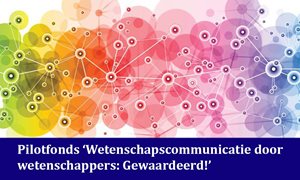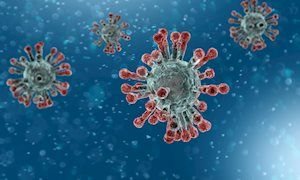24 January 2019
Collaboration
There is hardly any documented experience with conducting health research with people with an intellectual disability. During her PhD research, Tessa Frankena collaborated with two co-researchers from this target group. Together with Anneke van der Cruijsen and Henk Jansen, she conducted a literature study, questionnaires research, a Delphi study and a reflective study among people with and without intellectual disabilities, including the researchers. Based on this, Frankena, together with 17 experts without and 40 experts with an intellectual disability, developed a consensus statement on inclusive health research. This guideline should make it easier for other researchers to conduct health research with people with intellectual disabilities. The recommendations can also be applied to other groups, such as people with dementia.
Co-researcher
"This way of doing research is unique in the world," says Frankena. "We used the position of co-researcher, which meant that Anneke, Henk and I collected and interpreted research forms, interview questions and data together. Especially the interpreting of data is crucial in determining the value of data.” In her thesis, Frankena states that working with people with intellectual disabilities is a challenge: “It is difficult to relinquish control. You have to try and predict, in consultation with the co-researchers, which tasks they will be able to do.”
Participation Act
Vulnerable groups are expected to actively participate in society. The Dutch Participation Act that came into force in 2015 is part of this commitment. The law stipulates that anyone who can work, but cannot thrive in the labor market without support, must be able to find work. Since 1 January 2019, employers who do not comply with the Participation Act can be fined. "I want to make a plea to invest these paid fines back into the sector," says Frankena. "For instance, as a reward for organizations that invest extra time and resources in hiring people with certain challenges in the job market."
Tessa Frankena did her research at the academic workplace Sterker Op Eigen Benen (‘Stronger on Your Own Two Feet’), a collaboration between Radboudumc and various care organizations for people with an intellectual disability.
 Patients are increasingly participating in scientific research into their condition. But how do you do that with people with intellectual disabilities? Tessa Frankena figured it out, with the help of two colleagues who have an intellectual disability themselves. Frankena obtained her PhD on 14 January 2019, for her research that has led her to draw up a guideline for the performance of inclusive health research.
Patients are increasingly participating in scientific research into their condition. But how do you do that with people with intellectual disabilities? Tessa Frankena figured it out, with the help of two colleagues who have an intellectual disability themselves. Frankena obtained her PhD on 14 January 2019, for her research that has led her to draw up a guideline for the performance of inclusive health research.
Collaboration
There is hardly any documented experience with conducting health research with people with an intellectual disability. During her PhD research, Tessa Frankena collaborated with two co-researchers from this target group. Together with Anneke van der Cruijsen and Henk Jansen, she conducted a literature study, questionnaires research, a Delphi study and a reflective study among people with and without intellectual disabilities, including the researchers. Based on this, Frankena, together with 17 experts without and 40 experts with an intellectual disability, developed a consensus statement on inclusive health research. This guideline should make it easier for other researchers to conduct health research with people with intellectual disabilities. The recommendations can also be applied to other groups, such as people with dementia.
Co-researcher
"This way of doing research is unique in the world," says Frankena. "We used the position of co-researcher, which meant that Anneke, Henk and I collected and interpreted research forms, interview questions and data together. Especially the interpreting of data is crucial in determining the value of data.” In her thesis, Frankena states that working with people with intellectual disabilities is a challenge: “It is difficult to relinquish control. You have to try and predict, in consultation with the co-researchers, which tasks they will be able to do.”
Participation Act
Vulnerable groups are expected to actively participate in society. The Dutch Participation Act that came into force in 2015 is part of this commitment. The law stipulates that anyone who can work, but cannot thrive in the labor market without support, must be able to find work. Since 1 January 2019, employers who do not comply with the Participation Act can be fined. "I want to make a plea to invest these paid fines back into the sector," says Frankena. "For instance, as a reward for organizations that invest extra time and resources in hiring people with certain challenges in the job market."
Tessa Frankena did her research at the academic workplace Sterker Op Eigen Benen (‘Stronger on Your Own Two Feet’), a collaboration between Radboudumc and various care organizations for people with an intellectual disability.
Related news items

Participating in cancer research among people with intellectual disabilities
30 November 2021 Thanks to the support of the Maarten van der Weijden Foundation research was carried out into the participation of people with intellectual disabilities in (population) screening for cancer. go to page
General practice examines treatment and persistent complaints COVID-19 ZonMw grant for three major projects
3 August 2021 ZonMw has granted a total of 4.3 million euros for research into the treatment of COVID-19 and the symptoms that many people continue to have afterwards (Lung COVID). The research group of the department Primary and Community Care Medicine is co-applicant of these research projects. go to page
Henk Schers appointed professor of Regional Network Formation of General Practice
14 July 2021 His research focuses on innovations in the collaboration between healthcare providers from inside and outside the hospital go to page
Maarten van der Weijden Foundation selects Radboudumc research for recruitment campaign Preventing cancer in people with intellectual disabilities
1 June 2021 The Maarten van der Weijden Foundation, founded by top swimmer Maarten van der Weijden, supports several innovative cancer research projects each year. One of the three selected this year is Radboudumc's research into the prevention of cancer in people with intellectual disabilities. go to page

